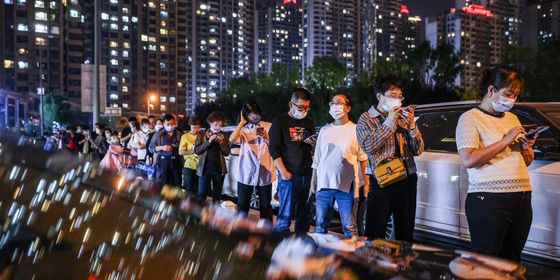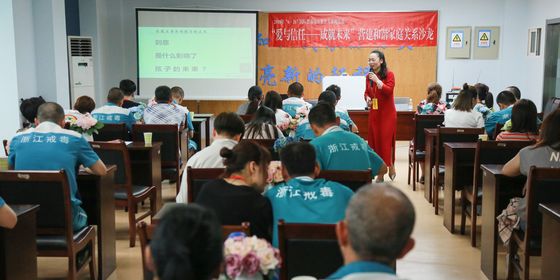Students in China’s non-traditional higher education programs struggle with discrimination
Two years after he began his postgraduate course at the Nanjing University of Science and Technology, after a dozen rejection letters from prospective employers, Zhang Wei (pseudonym) is considering hiding evidence of his advanced studies and reverting back to his bachelor’s degree on his CV.
“It may be easier to find a job,” Zhang lamented to The Paper, discouraged by a series of recent reports on job market discrimination against “part-time” postgraduates like him.
On August 31, a netizen complained on People.cn that he was disqualified from applying for teaching positions in Ordos, Inner Mongolia, because he was a “non-full-time (非全日制)” postgraduate. Often working as full-time employees while pursuing further study, part-time postgraduates can select courses on evenings, weekends, and other holidays, differentiated from full-time students who live and study off-the-job.
This triggered a flood of reports on similar cases of discrimination against graduates of such academic programs, including a postgraduate who was denied a teacher’s post in Hainan province simply because she did not graduate from a full-time program, despite obtaining the highest results in her candidate pool in both the recruitment examination and the interview.
Apart from the hiring process, those who pursued a postgraduate degree part-time are excluded from many cities’ preferential policies to attract high-skilled workers to their job market, such as the housing and living allowances offered to workers with advanced degrees in Shenzhen and in Harbin, the capital of Heilongjiang province, according to the reports.
Much of the prejudice against part-time postgraduate students is a legacy of the now-discontinued “on-the-job” postgraduate (在职研究生) programs, introduced in the 1990s by the Academic Degree Committee of the State Council. Such degrees were introduced by universities to college graduates who already have working experience and are still working, to cultivate more talent with practical expertise in fields such as business administration, law, education, architecture, and medicine. Candidates took different entrance tests from the national postgraduate entrance examinations, and only received a Master’s degree on graduation without a graduation certificate.
Some universities were even permitted to admit candidates on their own, sometimes charging high fees of over 50,000 RMB, and some officials and managers of enterprises used their connections to obtain on-the-job degrees as a path to easy promotion, a professor of the Huazhong University of Science and Technology alleged to Shenzhen News in 2010. This contributed to perceptions that part-time postgraduate programs were less rigorous than full-time studies.
To regulate postgraduate education, the Ministry of Education (MOE) cancelled on-the-job programs in 2017, and stipulated that both part-time and full-time postgraduate students have to sit in the same entrance examinations and must earn the same course credits to receive their degrees. Since these reforms, the MOE has stressed that the diploma and graduation certificate of part-time students are legitimate as those of their full-time classmates.
However, this has failed to change the stereotype. “Many people are simply doubtful upon hearing the term “part-time,” believing [we] buy a diploma while working,” a Beijing part-time postgraduate identified as Li Yun complained to The Paper this month. Weibo users have commented, “Why did I choose a full-time program if there was no difference between the two?” and “Don’t you [part-time] postgraduates known how incompetent you are?”
Students like Zhang feel they are victims of unfair discrimination. Sometimes the distinction is in name only: A part-time postgraduate surnamed Ma in Hefei, Anhui province, tells TWOC that one of her part-time classmates actually studied full-time together with the full-time students, though not all part-time students could afford to do this, as their tuition fees were much higher and they were not eligible for a dormitory, scholarships, loans, or “excellent student” awards through the school. Some part-time students feel they put even more effort than their full-time peers into meeting high academic requirements while working full-time.
In fact, discrimination based on education background is common in China’s competitive job market, where recruitment ads frequently require candidates to be graduates of prestigious “985 Project” or “211 Project” universities, or “first-class” academic disciplines.
Despite this discrimination—or perhaps, because of worse job discrimination for those without a college diploma at all—an estimated 3 million candidates registered to take entrance examinations to non-traditional higher education programs in China.
Students who do not get the required score for admission to three or four-year colleges in the national college entrance examinations (gaokao) can pursue further studies to acquire a diploma or skill through “adult education” programs. These include “learning by correspondence” programs and “night courses.” Institutions offering adult education programs have since increased in number, including distance learning colleges, “radio and TV universities” which teach by broadcast, and managerial training institutes. The State Council states that degrees obtained through adult education programs are proof of “comparable educational competence” with graduates who enter traditional full-time college programs via national examinations.
In 1981, the MOE also introduced the “self-taught higher education examinations.” Junior high school, senior high school, and three-year college graduates may study on their own under a standardized curriculum to obtain higher diplomas. This program allows students who are unable to attend lectures at all, such as prisoners, to obtain higher education.
Although the MOE has declared degrees from nontraditional programs equally legitimate, both employers and schools continue to regard students from such programs as inferior in educational caliber to full-time students. Zhou Guangli, a professor at Renmin University’s School of Education, alleged to China Newsweek last October, “The educational quality of part-time postgraduates cannot be safeguarded, and the performance of part-time postgraduate candidates is poorer than that of full-time students.”
Though the MOE, the Ministry of Human Resources and Social Security, and other three departments jointly issued a notice in February requiring local governments, businesses, and universities to maintain the equal rights of part-time and full-time students, it has not provided any concrete guidance on how to safeguard these rights. Zhang, the student, observes that university departments tend to pass the buck when part-time students complain about difficulties obtaining housing or living allowances, and there are no real consequences when universities refuse to provide such services.
“To eliminate discrimination, [the government] should ensure the educational quality of different programs,” concluded Xiong Bingyuan, president of 21st Century Education Institute, in his interview with The Paper. “On the other hand, it should strengthen employment equality and correct and punish discriminatory employers.”
Cover image from pexels












